Is there such a thing as a distinctive Australian SF voice? At the level of idiom, most certainly. In more fundamental ways, well, that’s a subject for debate. All I know for sure is that when I read Australian science fiction I feel the difference. It’s a difference that reflects sensibilities born of life in a hot and dusty country. Unlike Australia’s indigenous people, who traditionally perceived themselves to be one with the environment, Australia’s convicts and migrants and farmers saw life as more of a battle against that harsh environment. Both points of view have a place in Australian science fiction—although arguably the notion of struggle dominates. Rugged individual meets rugged climate; sometimes literally, more often metaphorically. Think anti-authoritarian anti-hero/ines versus dangerous socio-political forces.
Of course that’s not all there is to Australian science fiction—however, there is only room to feature five books in this post—and the following are all good representatives of Australian anti-establishmentarian sentiment. Fresh, blunt and uninhibited, these books are not just loaded with Aussie inflection; they also (whether deliberately or not) echo contemporary Australian socio-political debates.
Traci Harding—The Ancient Future: The Dark Age
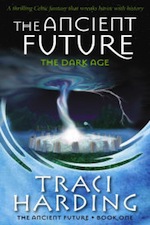 The heroine of this time-traveling alien-culture souls-reincarnating adventure is an Australian woman who finds herself living in the dark ages, yet still with some access to important modern conveniences (like her digital music collection, tampons, and a complete replica of her bedroom at home). The voice of Tory is unequivocally Australian, even if the setting is not. Within days of her arrival back in the dark ages, Tory is working hard to establish women’s rights, temper the violent disposition of the times, and tame a prince or two. She even takes on the most powerful man of dark ages mythology: “Thou art making decisions concerning me without my knowledge … that be not my only beef with thee though, Merlin. I have a list.” The story might not be set in Australia, but the author’s voice rings with the humor and determination of her compatriots. It is also a prime example of the truism that Australians are, to the last woman standing, funny.
The heroine of this time-traveling alien-culture souls-reincarnating adventure is an Australian woman who finds herself living in the dark ages, yet still with some access to important modern conveniences (like her digital music collection, tampons, and a complete replica of her bedroom at home). The voice of Tory is unequivocally Australian, even if the setting is not. Within days of her arrival back in the dark ages, Tory is working hard to establish women’s rights, temper the violent disposition of the times, and tame a prince or two. She even takes on the most powerful man of dark ages mythology: “Thou art making decisions concerning me without my knowledge … that be not my only beef with thee though, Merlin. I have a list.” The story might not be set in Australia, but the author’s voice rings with the humor and determination of her compatriots. It is also a prime example of the truism that Australians are, to the last woman standing, funny.
Harding’s perspective: Back home we hardly wear any clothes half the year, it be too hot.
Marianne de Pierres—Nylon Angel
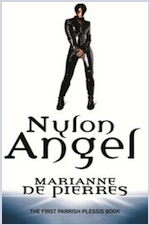 The Parrish Plessis series is set in an overpopulated, technologically advanced and politically corrupt Australia. However, it is not the geography that makes these books so Australian. Class conflict is an enduring Australian literary theme, one that manifests in science fiction the same as anywhere else. Although not explicitly political, Marianne de Pierres’s dark vision of the consequences of socio-economic inequality provides the dystopic backdrop to this cyberpunk adventure series.
The Parrish Plessis series is set in an overpopulated, technologically advanced and politically corrupt Australia. However, it is not the geography that makes these books so Australian. Class conflict is an enduring Australian literary theme, one that manifests in science fiction the same as anywhere else. Although not explicitly political, Marianne de Pierres’s dark vision of the consequences of socio-economic inequality provides the dystopic backdrop to this cyberpunk adventure series.
In Nylon Angel, de Pierres imagines the extremes to which a growing class divide could lead: the rich living in comfortably fortressed suburbs, the poor hand-to-mouth in the toxic waste-dumps of failed urban communities. The main character—Parrish, a young bodyguard stuck working for a criminal who uses rape as a means to subdue his employees—agrees to take a dodgy assignment from a rival criminal in the hopes of securing her own personal freedom. As we follow Parrish on her quest for some important files regarding what ails Australia, we also tour a beautiful country gone horribly wrong. It’s not just that the soil is poison, the air oppressive, the people lawless and the law unsympathetic. It’s a good thing, then, that De Pierres has a dark sense of humor. If you couldn’t laugh at Parrish’s world, you’d cry.
De Pierres’s future Australia: …since they stopped piping clean drinking water in, the Interior had fallen to aridity and lack of interest. It was a place of feral creatures, snakes and some pretty brutal mining cliques…
Meg Mundell—Black Glass
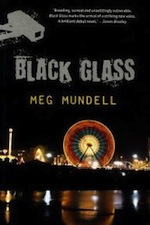 Meg Mundell is a Kiwi writer who lives and works in Melbourne. She sounds Australian. Her mournful tale of two sisters from the country looking for each other in a depraved and socially bifurcated near-future Melbourne is riddled (in a good way) with the ironic Australian voice and captures an near-constant sense of struggle between both the sexes and the classes. When a woman criticizes her husband for ogling the legs of a 13-year-old girl, he replies, “Alright, don’t get all femmo on me.” In the future Australia of Black Glass, the promise of egalitarianism has not prevailed. Life remains particularly hard for the poor, immigrants (undocumented), and women. Some kind of repressive state lurks behind the glossy façade of the cities. Modern urban living leans to the seedy and synthetic. This is not the Australia of travel books; it is an Australia that has lost touch with all things natural. Like the best dystopian fiction, Black Glass takes the familiar and distorts it, providing an ugly mirror of our worst potential. Thought-provoking stuff.
Meg Mundell is a Kiwi writer who lives and works in Melbourne. She sounds Australian. Her mournful tale of two sisters from the country looking for each other in a depraved and socially bifurcated near-future Melbourne is riddled (in a good way) with the ironic Australian voice and captures an near-constant sense of struggle between both the sexes and the classes. When a woman criticizes her husband for ogling the legs of a 13-year-old girl, he replies, “Alright, don’t get all femmo on me.” In the future Australia of Black Glass, the promise of egalitarianism has not prevailed. Life remains particularly hard for the poor, immigrants (undocumented), and women. Some kind of repressive state lurks behind the glossy façade of the cities. Modern urban living leans to the seedy and synthetic. This is not the Australia of travel books; it is an Australia that has lost touch with all things natural. Like the best dystopian fiction, Black Glass takes the familiar and distorts it, providing an ugly mirror of our worst potential. Thought-provoking stuff.
Mundell’s view of life in the lucky country: Thick coils of heat lay trapped between the buildings, the sunlight burned your eyeballs, and a constant slick of sweat coated her skin. All day she hunted fresh water, and at night she dreamed of mysterious taps rising from the asphalt.
Andrew Macrae—Trucksong
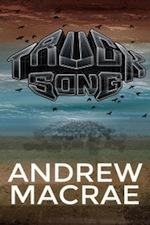 As Andrew Macrae describes it in his biography, Trucksong was inspired by “the mournful sounds of semi-trailers as they crawled up and down the Great Dividing Range.” As a fan puts it, “This is a weird mongrel of a book.” The lyrical vernacular of Australia permeates this unusual novel about sentient trucks and the detritus of humanity—all duking it out for survival in a Mad Max meets Riddley Walker kind of a world. Weird as hell, and yet very endearing in spite of being set amongst “bodies of roadkilled roos and camels and people too, black as engine oil from a busted sump.” It’s a good thing that the main character, the classic underdog (and underfed), John Ra, very quickly steals your heart with his loyal if murderous ragamuffin ways.
As Andrew Macrae describes it in his biography, Trucksong was inspired by “the mournful sounds of semi-trailers as they crawled up and down the Great Dividing Range.” As a fan puts it, “This is a weird mongrel of a book.” The lyrical vernacular of Australia permeates this unusual novel about sentient trucks and the detritus of humanity—all duking it out for survival in a Mad Max meets Riddley Walker kind of a world. Weird as hell, and yet very endearing in spite of being set amongst “bodies of roadkilled roos and camels and people too, black as engine oil from a busted sump.” It’s a good thing that the main character, the classic underdog (and underfed), John Ra, very quickly steals your heart with his loyal if murderous ragamuffin ways.
Macrae’s future Aussie battle cry — evoking the blind, brave futility of Gallipoli: Let me die in trucktyre shoes tied up with twine so they’ll know I died standing up.
John Marsden—Tomorrow, When the War Began
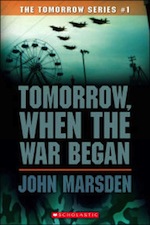 Five kids “go bush, go feral,” for a few days during the holidays. They’re allowed to do this because Australian kids are not mollycoddled. As predicted, the worst thing that happens is that they find a snake in one of their sleeping bags. However…when they get home to their rural farm houses they find their parents missing, their animals dead, something seriously wrong with their world. So begins what is possibly Australia’s most popular speculative fiction novel of all time (with over three million sales to prove it and the #1 ranking on the Better Reads 2013 Top 100 Favourite Homegrown Reads List). As it says in the blurb for my yellowed old copy, “the first of a trilogy, When the War Began is truly an insomniac’s nightmare.” I list it here because kids who don’t read anything will lose sleep to finish this series. Adults with genre boundaries suddenly don’t care that it’s young adult or speculative. An addictive adventure/mystery story set in a future Australia that is pretty scary for kids, invaded by people (we never know exactly who) who plan to either enslave or kill the existing inhabitants, this book echoes the brutal colonial history of Australia and reflects upon the impact of WWII upon the Australian character, as well as offering insight into contemporary life as a young Australian growing up in a rural town.
Five kids “go bush, go feral,” for a few days during the holidays. They’re allowed to do this because Australian kids are not mollycoddled. As predicted, the worst thing that happens is that they find a snake in one of their sleeping bags. However…when they get home to their rural farm houses they find their parents missing, their animals dead, something seriously wrong with their world. So begins what is possibly Australia’s most popular speculative fiction novel of all time (with over three million sales to prove it and the #1 ranking on the Better Reads 2013 Top 100 Favourite Homegrown Reads List). As it says in the blurb for my yellowed old copy, “the first of a trilogy, When the War Began is truly an insomniac’s nightmare.” I list it here because kids who don’t read anything will lose sleep to finish this series. Adults with genre boundaries suddenly don’t care that it’s young adult or speculative. An addictive adventure/mystery story set in a future Australia that is pretty scary for kids, invaded by people (we never know exactly who) who plan to either enslave or kill the existing inhabitants, this book echoes the brutal colonial history of Australia and reflects upon the impact of WWII upon the Australian character, as well as offering insight into contemporary life as a young Australian growing up in a rural town.
Although the premise is quite brutal and the realities of life as bush fugitives are never denied, this is also a story that appeals to many Australians’ (young and old) fantasy of living life off the land, or at the very least somehow learning to negotiate its treacherous and beautiful nature.
Marsden’s perspective: This was my country; I felt like I had grown from its soil like the silent trees around me, like the springy, tiny-leaved plants that lined the track.
Jackie Hatton is the author of Flesh and Wires (Aqueduct Press), a post-apocalyptic, post-alien novel that imagines women as the agents of their own destiny.










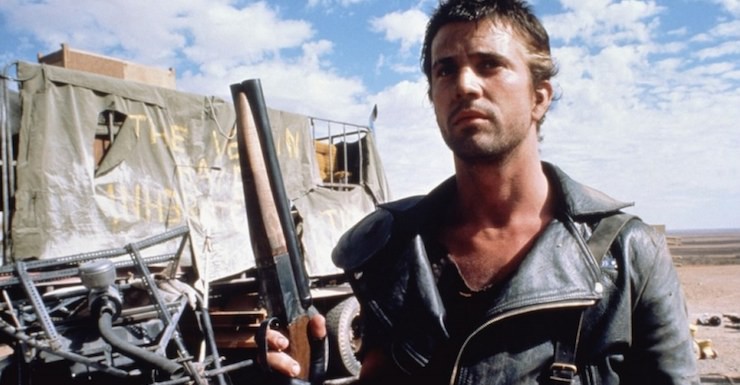
On the Beach
Ambelin Kwaymullina’s YA trilogy about the Tribe. First book is The Interrogation of Ashala Wolf, and I am going to hunt down the other two by hook or by crook, even if I end up ordering them from Australia.
If you count authors who became Australian citizens, then I have long been partial to A. Bertram Chandler’s stories.
On the topic of the Australian voice in SF, I wrote a piece mulling over this a while ago over at the MRB. It’s too long to repeat here, though you can find it here if anyone is at all interested.
One problem of course with trying to identify Australian SF as something distinct is that Australia, much like the US, is an immigrant country drawing on many cultural inputs, but also with a lot of distinct climactic regions. Hot, dry and dusty doesn’t describe Tasmania or the Southeast of Victoria at all, and from a somewhat outsider perspective, I suspect that twee cultural obsessions with oldee timee outback sheds and bush rangers might actually be holding Australia back quite a bit in terms of growing into a national identity that is more than just Gallipoli and bush rangers and anti-authoritarianism.
Also, on this point:
I don’t want to come across as attacky, but, ok, where do we start? The many, many Aboriginal nations were culturally diverse and it’s extremely debatable to what degree one tribe saw itself as ‘part of nature’ more or less than Europeans did. The notion that Aboriginal people were more in tune with nature is playing into old colonial notions of the noble savage… Aboriginal people were engaging in merely just fire-stick agriculture and target prey rotations, but actual crop planting in some parts of the country, and some fairly advanced architecture; the building of square-walled stone houses in parts of the South-East for example. The various mythologies are admittedly difficult to comprehend from an outside perspective, but I really don’t think that’s because they engaged in a somehow more naturalistic view of themselves (my feeling is the apparent strangeness of many Aboriginal stories seems to have something more to do with differing notions of how time works)… like most human cultures, many, or maybe most Aboriginal people viewed themselves as special, divinely chosen and separate from nature. Anyway, I realise that it was an offhand comment and you didn’t mean anything by it.
It’s just that as someone who grew up in New Zealand where Maori is a national language and taught in schools, and the Maori culture is integrated into Pakeha culture to the point that European New Zealanders refer to themselves by the Maori name, the biggest stand-out character of Anglophone Australia remains the various problems of race. I say that having lived in the UK and Ireland, and spent a fair amount of time in the US too.
If there is one country in the world that would benefit form a body of science fiction that focused on questions of colonialism and race, it is Australia. Unfortunately, if there is one country in the world that is afraid to focus on questions of colonialism and race, it is Australia.
End of (slightly) irritated rant. I written that quite quickly without much re-reading. Hope it makes sense and isn’t too angry sounding.
Chris
No hat tip to Damien Broderick? His The Dreaming Dragons really deserved more attention. George Turner is another Australian SF author who seems to have dropped off everyone’s radar, but his The Sea and Summer is an early treatment of the effects of global warming.
Some of Garth Nix’s short stories have been classified as science fiction, but I dunno if any of them (or much of his more prolific fantasy) could be said to have an “Australian flavor.”
I recommend anything by Patricia Wrightson, especially her The Ice Is Coming trilogy — her portrayal of Euro-Australians as “The Happy People” is instructive, to say the least. “They were happy — they said so themselves, frequently.” She had a wonderful appreciation of Aboriginal mythology.
Thank you for all your comments. It is hard to capture the diversity of Australian SF in one small blog — let alone the diversity of geography, climate, peoples and politics. I really appreciate the addition of other great Australian works to my list. Let’s make it a really long list! And yes, I also welcome commentary that develops or challenges my own brief observations.
And finally, I have to say it, I grew up in Tasmania and although it is very different from the desert world of the interior, it can also get very hot, dry and dusty in the summer. One crackling, blistering year, the bushfires came to my back door!
Jackie H.
I would highly recommend the urban fantasy of Keri Arthur.
Alexis Wright’s “The Swan Book” is set in the future, after the Climate Change Wars, and contains many elements of magic realism, mythology, fantasy, political satire. . . It’s a difficult book, with some challenging themes and episodes. And a rare example of genuinely Australian capital-L Literature dipping a toe into SF.
Somewhat more approachable is Greg Egan’s “Distress” – the Australian perspective is less overt but definitely there in descriptions of everyday inner-urban life and in how the main character, Worth, perceives politics, history and technology.
I don’t know if he has a distinct Australian flavour, but no list of Australian sf authors should leave out Greg Egan.
Absolutely agree with the above mentions of Damien Broderick and Greg Egan. These two have an intensely well educated understanding of both cutting edge science and the socio-political future potential landscape. They are also adults talking about adult themes in an adult (or sometimes post-human) world. Must reads. Although Egan claims not to be writing “Australian SF” I doubt he would have written what he has without being Australian.
Trent Jamieson’s Death Works urban fantasy set in Brisbane. Love his realistic portrayal of a Queensland Christmas especially!
I honestly wished for the inclusion of Souls in the Great Machine, the entire Great Winter Trilogy is beautiful, 2 of the books are set in Australia, spanning the entire continent and describing it so well. Nobody seems to know about these books, they are so great!
No Terry Dowling? Between the Tom Rynosseros books and his Wormwood stories you have some of the best Australian SF ever written.